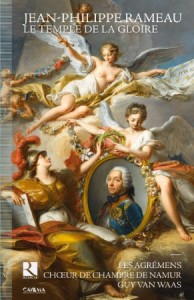What with its frills and dances, most French Baroque opera almost begs to keep its distance from its listeners, but we simply have to get over it. It wasn’t composed for the public and has to be heard that way; the mostly moronic or allegorical or complicated plots are invariably metaphors for praising the King, Louis XIV for the most part (early on, with the operas of Lully), although this one, composed in 1745, was in praise of Louis XV. These operas sound like Versailles looks, and we couldn’t live there either. It would be too hard to heat, and one might also say the same for the operas. But wait a moment, let the tourists leave, forget that you are an outsider, and you will hear sounds that no other country has created.
The opera in question here was written by Rameau at the request of the Duc de Richelieu to rejoice in the return of Louis XV after a triumph at Fontenoy, during the War of Austrian Succession, something that I’m certain is often on your minds. The libretto by Voltaire consists of three sort-of stand-alone acts and a Prologue: each act concerns a King attempting to enter the Temple of Glory. The disagreeable warrior Belus is first and the pleasure-loving Bacchus is second. They are both turned away. In the last act, the soldier/philanthropist/good guy, Roman Emperor Trajan, pops up and is allowed in, and true to his nature he dedicates the Temple to the public good.
The Prologue, incidentally, features Envy and his band of demons attempting to take over the Temple; Apollo and a bunch of heroes foil that attempt. Needless to say, Louis XV was Trajan in this setting. Sadly, the relationships between the Kings depicted and their women/wives/mistresses were meant to faintly mirror that of Louis and Madame de Pompadour, his mistress. It’s a pity that Louis’ wife, Marie, and their kids were in attendance and this undoubtedly led to the King’s sour reception to the opera. It failed, and after 1746 it disappeared until score and text were discovered a few years ago.
You’ll know if you love/need/loathe it by the time the overture is over: pompous, grand, and martial, it resounds fiercely with the full complement of strings, two piccolos, two trumpets, two (fabulously braying) horns, flutes, and oboes; it deserves its own standing ovation. For lovers of florid singing, try track 8 on CD 1, in which the hero Apollo, written for haute-contre, summons the Muses to “charm and instruct the universe”. Lydia’s first aria, a da capo (almost unheard of at the time), is a lament backed up by bassoons. And when the shepherdesses show up in the first act, we also get the soft, reedy sounds of musettes. Once Rameau’s idiom becomes familiar, you realize how the music for the Belus act is more angry and war-like than the simply joyous Bacchus act or the splendid Trajan finale.
The performance, by a group heretofore unknown to me, is impeccable. Solo vocal standouts are the bluff, nasty bass Alain Buet, who sings Envy and Belus; the characterful and lovely soprano Judith Van Wanroij as both Lydia (a princess jilted by Belus) and Plautine (Trajan’s wife); and Matthias Vidal, a full-bodied haute-contre as Apollo, Bacchus, and Trajan. The two other soloists, Katia Velletaz and Chantal Santon-Jeffrey, in multiple roles, are stars in their own right. The expertly trained choir and orchestra under Guy Van Waas, singing and playing with verve and even vibrato, turn this piece into the celebration it was meant to be, and the recording is vivid and brilliant. And did I mention that the entire opera-ballet takes just over two hours? This is the perfect way to acquire the taste for French Baroque.
































